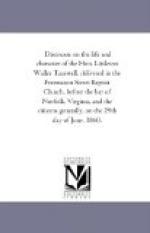The same reasons which induced Mr. Tazewell to oppose the restrictive policy of the administrations of Jefferson and Madison, led him necessarily to oppose the war of 1812 with Great Britain. He believed that, if a declaration of war had been expedient at any period of the commercial difficulties with England and France, the proper time for declaring it was when the offence was given, and when our commerce was at the height, and our ability to sustain hostilities was proportionally greater; that the administration, having waived the opportunity of making a declaration in the first instance, and deliberately adopted the policy of diplomacy and of commercial regulation as the proper means of relief, our resources meantime having become crippled and our revenue almost annihilated, it was bound to adhere to it during the existing crisis; that the long and expensive war had impaired the resources of England and France, who would soon be compelled from mere exhaustion to make peace, and with the restoration of peace our difficulties would necessarily terminate, and we might demand redress for the grievances which we had sustained at their hands; that a declaration of war with England would be substantially, as it turned out to be, a receipt in full for our enormous commercial losses caused by her orders in council, which losses must then be assumed by our own government, or fall on the merchants, who would be crushed by their weight; that peace among the belligerents might happen at any moment, while a war with one of them would certainly involve a large expenditure of blood and money, and might continue at the pleasure of the belligerent long after a general pacification in Europe; and that, if war was to be waged as a measure of redress for our violated rights, as both belligerents were equally guilty, it should be declared against both.
In weighing the reasons on which any measure of public policy is founded, we must always refer to the time when the deed was done and to the position of the actors. At the present day, looking at the results which are believed to have flowed from the war of 1812, and especially our victories on the sea, we are inclined to blame those who opposed its declaration, and extol the wisdom and gallantry of those who approved it. This test, however, is neither philosophical nor just; and, as a proof of the soundness of Mr. Tazewell’s opinions, or that at least they were not taken up, as has been alleged, from hostility to a democratic




